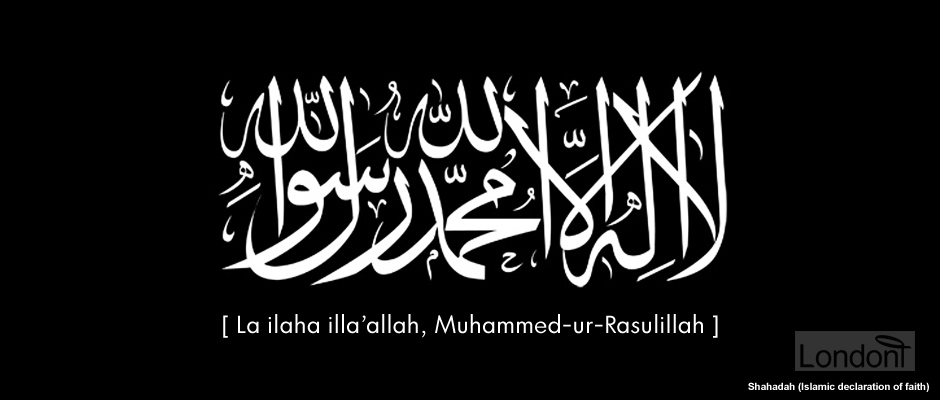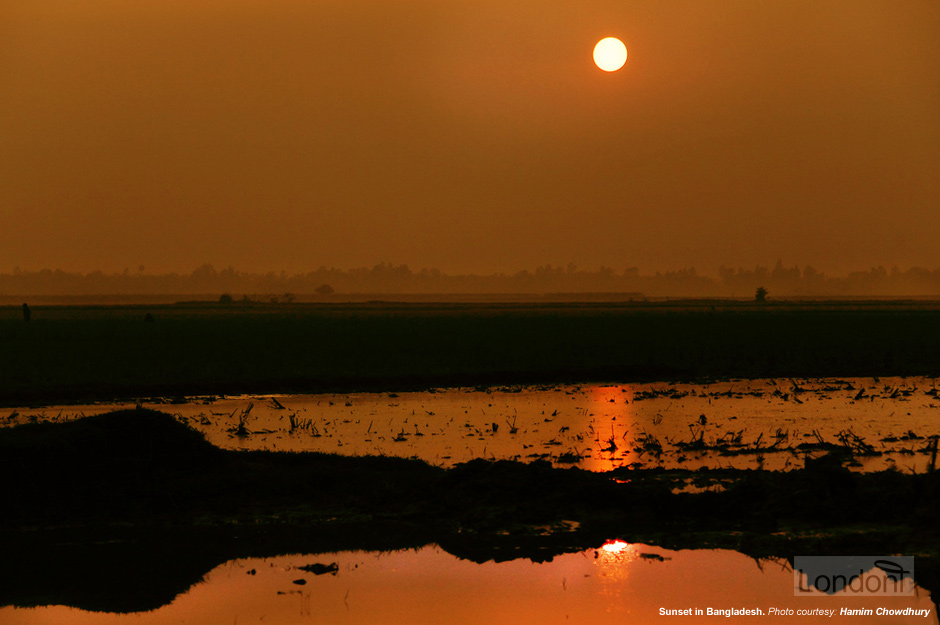This introduction to Islam is from a Sunni perspective.

Basic introduction to... Islam
- Ranking: 2nd largest in the world with 1.6 billion followers (23%)
- Creator: Allah (May He be Glorified and Exalted)
- Prophet / Leader: Muhammad (Peace Be Upon Him, abbreviated to pbuh)
- Main book: Qur'an
- Formally established: circa 610 AD
- Follower: Muslim
- Denomination (branch of faith): Sunni (approx 90%) and Shi'a (10%)
- Core belief(s): Seven articles of faith:
1. Belief in Allah
2. Belief in His Angels
3. Belief in His Books (Kitabs)
4. Belief in His Messengers (Nabis)
5. Belief in the Day of Judgment (Qiyamat)
6. Belief in Fate (Taqdeer)
7. Belief in the Life after Death - Core practise(s): Five pillars of Islam:
1. Shahadah (Declaration of faith)
2. Salat / Namaz (Prayer)
3. Zakat (Charity)
4. Sawm (Fasting - 'Ruza' in Bengali)
5. Hajj (Pilgrimage) - Place of worship: Masjid (Mosque)
- Mode of prayer: 5 daily prayer (Fajr, Zuhr, Asr, Maghrib, Isha) spread out throughout the day. Congregational prayer ('Jummah') every Friday just after noon
- Heaven and Hell: Muslim believe in two lives: in this world and Hereafter (living eternally in Heaven or Hell)
- Main festival(s): Eid-ul-Fitr and Eid-ul-Adha
- Dietary requirement: Halal food and drink
- More... Halal means 'permissible' and Haram means 'forbidden'.
Sunnah refers to saying or action of Prophet Muhammad (pbuh).
Hadith is a collection of traditions containing sayings and deeds of Prophet Muhammad (pbuh).
Muslims pray facing Qiblah - the direction of the Kaabah, the Sacred House in Makkah, Saudi Arabia
What is the religion / faith / belief?
Meaning of 'Islam' and 'Muslim'
Islam means "peace acquired by submitting your will to Almighty God". A follower of Islam is called a "Muslim", a person who submits his will to Almighty God.
Inna alddeena AAinda Allahi alislamu wama ikhtalafa allatheena ootoo alkitaba illa min baAAdi ma jaahumu alAAilmu baghyan baynahum waman yakfur biayati Allahi fainna Allaha sareeAAu alhisabi
19. Lo! religion with Allah (is) The Surrender (to His will and guidance). Those who (formerly) received the Scripture differed only after knowledge came unto them, through transgression among themselves. Whoso disbelieveth the revelations of Allah (will find that) Lo! Allah is swift at reckoning.
Islam is a monotheistic religion - believing in one god, Allah (Subḥānahu ūta'āla - May He be Glorified and Exalted - often abbreviated to "swt"). It is the second largest religion in the world today, behind Christianity, with an estimated 1.6 billion followers (23%), spread across the globe.
Islam is a complete way of life and refers to the total surrender of one's self to Allah (swt). However, it's not a one-sided relationship, where the believer is enslaved to Allah. Rather, the word Islam indicates a covenant between Allah and his followers, where a Muslim surrenders his or her will to Allah in return for peace or safety.
Is Islam a new religion and only 1400+ years old?
No.
Every Prophet beginning from Adam, through Nuh (Noah in Judeo-Christian text), Ibrahim (Abraham), Musa (Moses), Dawud (David), Isa (Jesus) and ending with Muhammad - Peace Be Upon All Of Them - all preached about the Oneness of Allah (Tawheed in Arabic), in the Prophethood (Risalat) and in Hereafter (Aakhirah). They were all Muslims.
Prophet Muhammad (Sallallahu alayhi wasallam - Peace Be Upon Him, abbreviated to "saw" or "pbuh") is the last prophet who was revealed the holy book, Qur'an, around 610 by Allah through angel Jibrail (may Allah be pleased with him). It's the Noble Qur'an and the practises (Sunnah) and authentic sayings (Hadiths) of the Prophet Muhammad (pbuh) which forms the foundation of the belief and are the fundamental sources of Islam.
Islamic calendar or Hijri calendar
Muslims believe that Islam has always existed since time immemorial, but for practical purposes, date the religion from the time of the migration of Prophet Muhammad (pbuh) from Makkah to Madinah (in Saudi Arabia) in 622 AD. This journey is called Hijrah (migration) and it's from this year (i.e. 622) that the Islamic calendar begins.
The calendar - known as at-taqwīm al-hijrī in Arabic - is denoted by H for Hijrah or AH for the Latin anno Hegirae (in the year of the Hijra), e.g. 1H or 1AH. Hence, the calendar is sometime also referred to as the Hijri calendar.
Why is this religion called Islam and not 'Muhammadism'?
Most, if not all the religions (or deens) around the world take their name from a specific person or a specific nation. For example, Christianity takes its name from Jesus Christ (pbuh), Buddhism from its founder Gautama Buddha, Zoroastrians from their founder and standard-bearer Zoroaster, Judaism from a tribe known as Yehudah (Judah), and Hinduism originally refers to the people living across the Indus River (northwest of India). And so on so forth.
Islam is not attributed to any specific man or to any specific nation because it's considered the religion for WHOLE humanity. It is an universal religion where only Allah the Creator should be worshiped and nothing else. Therefore, Prophet Muhammad (pbuh) is not founder of the religion but the last messenger who restored the original monotheistic faith of Adam, Ibrahim and other prophets whose messages had become corrupted over time (or according to some authorities only misinterpreted). Worshiping is reserved for Allah alone and and not His prophets who are only human beings, albeit the best of best.
What is the purpose of life?

Life is meant to be an arena whereby one struggles with good and evil. The Quran teaches that good and evil exist in the heart of every individual as well as in the society. The individual struggle is to act righteously in accordance with the Quran and prophetic example, and to shun one's own evil and its impulses. The collective struggle is to work with others to make the world a more righteous place.
Struggle for goodness
In Arabic, this inward and outward struggle is called jihad. While it can mean a militant struggle against those who attack the Muslim lands, it also signifies a person's struggle with the lower tendencies of the soul, the gravitational pull of self-destructive forces that lead to alienation from Allah (swt) and a state of spiritual disequilibrium.
Because humans inevitably fall short morally and succumb to these destructive tendencies from time to time, a means of reestablishing spiritual balance is given, called tauba or atonement. This is done by experiencing a genuine sense of remorse for one's transgressions and a removal of the unhealthy effects of that state by turning to God and seeking divine grace through prayer, charity, and a sincere resolution not to return to the destructive patterns of the past.
Enjoy the blessings of life
While life is seen as a spiritual test and journey, it is also seen as being filled with blessings from Allah (swt) to be enjoyed:
O Children of Adam! Look to your adornment at every place of worship, and eat and drink, but be not prodigal [wasters]. Lo! He loveth not the prodigals.
Say: Who hath forbidden the adornment of Allah which He hath brought forth for His bondmen, and the good things of His providing? Say: Such, on the Day of Resurrection, will be only for those who believed during the life of the world. Thus do We detail Our revelations for people who have knowledge.
Thus, in Islam, marriage is highly recommended and celibacy is frowned upon. The Muslim savants of the past identified sexual relations between a wife and her husband as a foretaste of eternal bliss with God in the afterlife. The Prophet Muhammad encouraged marriage and stated, "There is no monasticism in Islam".
In Islam, children are highly esteemed and seen as one of God's greatest blessings to humanity. The Prophet stated that humans were born innocent and later corrupted by their societies. Thus, parents are held responsible for maintaining that state of innocence and raising them with a sense of love and awe of the divine. Motherhood is highly regarded in the Qu'ran and the prophetic tradition. In most Muslim societies, adult women are still predominantly mothers and housewives during their productive years.
Paradise lies at the feet of mothers.
The Prophet
Learning resources
Some common words & phrases and their meanings...
- Alhamdulillah
- "Praise to Allah" - When you're happy about something, or after having finished something e.g. eating
- Allahu Akbar
- "Allah is great / greater" - Used in variety of places e.g. to express excitement. Known as 'takbir'
- Assalamu 'alaykum & Wa 'alaykum assalam
- "Peace be upon you" & "And upon you be peace" - When greeting someone & replying to the greeting
- Astaghfirullah
- "I seek forgiveness from Allah" - When saying you're sorry to Allah for a sin
- Bismillahir Rahmanir Raheem (Bismillah)
- "In the Name of Allah, the Compassionate, the Merciful" - Used before starting to do something e.g. reciting Qur'an. Commonly shortened to 'Bismillah'
- Fee eemanullah
- "In Allah's faith" - When giving in charity
- Fisabilillah
- "In the way of Allah" - When recommending good action
- Inna lillahi wa inna ilayhi rajiun
- "To Allah we belong and to Him we return" - When hearing about a death or tragedy
- In sha'Allah
- "If Allah wills" - When intending to do something in the future e.g. I will do...if Allah wills
- La Hawla Wa La Quwwata Illa Billah
- "There is no power and strength except with Allah" - Used in unfavourable situation beyond one's control e.g. distress
- Masha'Allah
- "What Allah wishes" - Expressing positive amazement i.e. a good omen
- Jazak Allahu Khairan (Jazakallah)
- "May Allah reward you with good" - When thanking someone. Commonly shortened to just 'Jazakallah'
- Nauzubillah
- "We seek refuge in Allah" - When you see / hear something bad or distasteful
- Subhanallah
- "Glory to Allah" - When praising something say or to express amazement
- Wallah
- "I swear to Allah" - When taking an oath
- Ya Allah
- "O Allah" - When in pain or distress
May Allah keep us all on the Sirat-al Mustaqim (Straight Path). Ameen.
